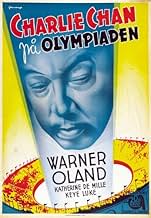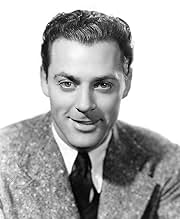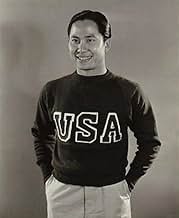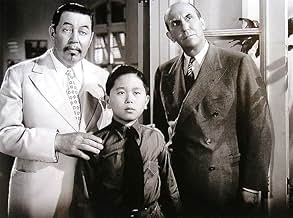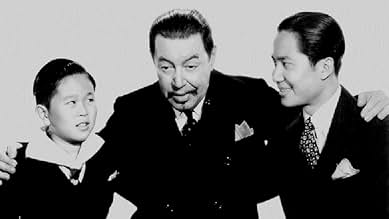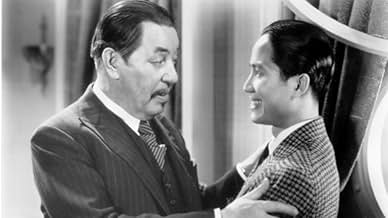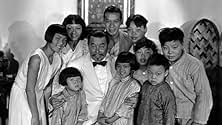CALIFICACIÓN DE IMDb
7.0/10
1.9 k
TU CALIFICACIÓN
Agrega una trama en tu idiomaWhen a strategically important new aerial guidance system is stolen, Charlie traces it to the Berlin Olympics, where he has to battle spies and enemy agents to retrieve it.When a strategically important new aerial guidance system is stolen, Charlie traces it to the Berlin Olympics, where he has to battle spies and enemy agents to retrieve it.When a strategically important new aerial guidance system is stolen, Charlie traces it to the Berlin Olympics, where he has to battle spies and enemy agents to retrieve it.
- Dirección
- Guionistas
- Elenco
Frederik Vogeding
- Captain Strasser
- (as Fredrik Vogeding)
William Begg
- Minor Role
- (sin créditos)
Brooks Benedict
- Zaraka Henchman
- (sin créditos)
Stanley Blystone
- New York Policeman
- (sin créditos)
Walter Bonn
- Polizei Officer
- (sin créditos)
Don Brodie
- Radio Announcer
- (sin créditos)
Opiniones destacadas
Some unnamed source at IMDb alleges that CHARLIE CHAN AT THE OLYMPICS, a film capitalizing on the then recent 1936 Berlin Olympics (taking place in Germany under Chancellor Hitler) and released on May 21, 1937, in the U.S and in the early fall of that year in Europe, was "pulled from circulation shortly after its release because it takes place in Nazi Germany." Could someone please define "shortly after its release"? The film, while sympathetically portraying the civilian police force in Berlin (interestingly played for irony and possibly surprise or subtext by frequent film villain Frederik Vogeding), pointedly incorporated actual newsreel footage of Jessie Owens' Olympic triumph which was so upsetting to the Herr Hitler. The film plot had considerable hurdles to surmount in avoiding the identification of the foreign power trying to steal the "McGuffin" military device. Most U.S. or British films of the period would have been more blatant in assuming the national guilty party, but Germany was still a major market for U.S. motion pictures (even if the Chan character himself must have been an anathema to Nazi Party leadership).
Even with the unsettling Anschlus in Austria and the Munich Crisis over the dismembering of Czechoslovakia; with the invasion of Poland and the formal start of European hostilities in World War II still a little more than a year away (U.S. entry into the conflict more than four years away!), America and much of the rest of the world was doing its best to ignore distressing realities within the Reich. While CHARLIE CHAN AT THE OLYMPICS had to do a fine dance to play to that desire to turn a blind eye, it largely succeeded. It is difficult to believe that 20th Century Fox would withdraw an entry in the wildly popular Chan series in anything which could be realistically considered "soon" (anything less than six months). A specific DATE of the withdrawal would be appreciated.
While the film over all may be one of the lesser Chan efforts, it has moments (the initial set-up in the U.S., the travelogue race to Berlin, the scenes in the Olympic Stadium and the final confrontation with the killers) which are as good as any in the canon. To be dismissed as "pulled from circulation shortly after its release" if it is demonstrably not true would be unfortunate.
Even with the unsettling Anschlus in Austria and the Munich Crisis over the dismembering of Czechoslovakia; with the invasion of Poland and the formal start of European hostilities in World War II still a little more than a year away (U.S. entry into the conflict more than four years away!), America and much of the rest of the world was doing its best to ignore distressing realities within the Reich. While CHARLIE CHAN AT THE OLYMPICS had to do a fine dance to play to that desire to turn a blind eye, it largely succeeded. It is difficult to believe that 20th Century Fox would withdraw an entry in the wildly popular Chan series in anything which could be realistically considered "soon" (anything less than six months). A specific DATE of the withdrawal would be appreciated.
While the film over all may be one of the lesser Chan efforts, it has moments (the initial set-up in the U.S., the travelogue race to Berlin, the scenes in the Olympic Stadium and the final confrontation with the killers) which are as good as any in the canon. To be dismissed as "pulled from circulation shortly after its release" if it is demonstrably not true would be unfortunate.
"Charlie Chan at the Olympics" starring Warner Oland was made in 1937, with a backdrop of the 1937 Olympics which were held in Berlin, Germany.
Charlie is going to see Lee Chan compete in swimming when a device for airplanes, that allow them to work without a pilot, is stolen during a test run and the pilot is killed. Obviously someone was hiding on the plane and stole the device. Charlie sets out to help recover the device for the U.S. Lee meanwhile is on a ship with other Olympic hopefuls and a couple of suspects in the robbery.
Once in Germany, Charlie works with the Berlin police to help track down the thieves.
Never in your life have you seen more helpful Nazis. There is not one mention of the German political climate - and the footage of the Hindenburg had every single swastika airbrushed out. What is also interesting is the footage of the Olympics, including some of Jesse Owens.
I found this film somewhat distracting - a bunch of suspects, a bit confusing as to plot, probably because I was too busy looking at Olympic footage. However, I enjoyed it particularly because of Warner Oland and Charlie Jr., played by Layne Tom, Jr., who is delightful. Tom is still alive as of this writing, 85 years old, and became a prominent architect. This is one of his favorite films. I love Keye Luke but Lee here is a bit annoying as he kept misquoting his father and adding, "or something like that." Of course that was the script, but it was too much.
America was really trying to stay out of any potential conflict in Europe, as you will be able to tell from this film.
Charlie is going to see Lee Chan compete in swimming when a device for airplanes, that allow them to work without a pilot, is stolen during a test run and the pilot is killed. Obviously someone was hiding on the plane and stole the device. Charlie sets out to help recover the device for the U.S. Lee meanwhile is on a ship with other Olympic hopefuls and a couple of suspects in the robbery.
Once in Germany, Charlie works with the Berlin police to help track down the thieves.
Never in your life have you seen more helpful Nazis. There is not one mention of the German political climate - and the footage of the Hindenburg had every single swastika airbrushed out. What is also interesting is the footage of the Olympics, including some of Jesse Owens.
I found this film somewhat distracting - a bunch of suspects, a bit confusing as to plot, probably because I was too busy looking at Olympic footage. However, I enjoyed it particularly because of Warner Oland and Charlie Jr., played by Layne Tom, Jr., who is delightful. Tom is still alive as of this writing, 85 years old, and became a prominent architect. This is one of his favorite films. I love Keye Luke but Lee here is a bit annoying as he kept misquoting his father and adding, "or something like that." Of course that was the script, but it was too much.
America was really trying to stay out of any potential conflict in Europe, as you will be able to tell from this film.
Charlie has his youngest helper ever - or at least in any of the 20 Chan films I've seen - as 12-year-old Charlie Jr. joins Number One Son Lee as they both help dad solve a crime.
Lee (Keye Luke) plays a member of the United States Olympic swimming team in this adventure. The repartee between Chan (Warner Oland) and his two sons in here is terrific. Layne Tom Jr. plays Charlie Junior.
The Chan movie is more of an adventure than the normal whodunit as Charlie and the cops travel to the Olympics in Munich, Germany in search of a missing radar-plane "black box." Lee is kidnapped at the games and his dad does everything he can to get his kidnapped son back while not jeopardizing the United States in the process.
This is one of the better Chan films and will be available on DVD in December, 2006, as part of another Charlie Chan DVD package of four movies.
Lee (Keye Luke) plays a member of the United States Olympic swimming team in this adventure. The repartee between Chan (Warner Oland) and his two sons in here is terrific. Layne Tom Jr. plays Charlie Junior.
The Chan movie is more of an adventure than the normal whodunit as Charlie and the cops travel to the Olympics in Munich, Germany in search of a missing radar-plane "black box." Lee is kidnapped at the games and his dad does everything he can to get his kidnapped son back while not jeopardizing the United States in the process.
This is one of the better Chan films and will be available on DVD in December, 2006, as part of another Charlie Chan DVD package of four movies.
An experimental plane's guidance system is stolen and Charlie Chan's on the case. He follows the clues to Berlin, where the 1936 Olympic Games are being held. Amusingly, "Number One Son" Lee Chan is a member of the U.S. Olympic Swim Team. He even wins! As usual, Warner Oland is a perfect Charlie Chan. In addition to Keye Luke's Lee, this time we get Charlie Chan, Jr. He's played by Layne Tom, Jr. and is all kinds of adorable. I wonder why he wasn't made a permanent part of the series because he's a lot of fun. Also includes one of the loveliest actresses to appear in the entire Chan series, Katherine DeMille. Hubba-hubba! She was the adopted daughter of Cecil B. DeMille and future wife of Anthony Quinn. There's also some nice support from reliable character actors C. Henry Gordon, John Eldredge, and Jonathan Hale. Good cast in this one.
This entry in the series is most notable for it taking place during the 1936 Olympics, with footage from the games including Jesse Owens. Plus Charlie travels to Berlin on the Hindenburg. It also features pre-WWII German police portrayed in a much more sympathetic light than they would be just a few years later. Although, it should be noted Inspector Strasser (Frederik Vogeding) of the German police is kind of a boob ("Things like this cannot happen in Berlin!"). An excellent entry in the Charlie Chan series with high entertainment value and some added historical curiosity. Fans should love it.
This entry in the series is most notable for it taking place during the 1936 Olympics, with footage from the games including Jesse Owens. Plus Charlie travels to Berlin on the Hindenburg. It also features pre-WWII German police portrayed in a much more sympathetic light than they would be just a few years later. Although, it should be noted Inspector Strasser (Frederik Vogeding) of the German police is kind of a boob ("Things like this cannot happen in Berlin!"). An excellent entry in the Charlie Chan series with high entertainment value and some added historical curiosity. Fans should love it.
... that being that the film is set at the 1936 Olympics in Berlin.
A plane is doing a test flight with a brand new invention vital to the defense of the United States when the plane disappears. The audience can see inside the cockpit that someone hiding inside the plane overpowers the actual pilot, but the cast is denied this knowledge. Charlie Chan finds the plane with the body of the pilot nearby while on a fishing trip with one of his younger sons. A careful investigation leads suspicions to somebody who is part of the American Olympic team, and thus he has left Hawaii for Berlin. Therefore Chan goes to Berlin himself to continue the investigation. A further complcation is that oldest Chan son Lee is a competitor in the games there.
Set in 1936, there is quite a bit of stock footage of the 1936 Olympic games. There is one shot with the torch bearer running down the stairs with people in the crowd on either side of him clearly performing the Nazi salute. The Berlin police are portrayed as pedantic stumble bums whose hearts are in the right place and who act and dress like the Kaiser is still alive versus the rather lethal group that they had become by 1936 - not a group you'd want to tangle with.
What is really ironic is that Charlie postulates that the radio control device will be sold in Germany to some unnamed group of international terrorists because they feel "safe" in Germany during the games because of the presence of so many people from many nations. It's so interesting to see how the United States and the rest of the world did not take Hitler's Germany seriously until it was almost too late.
A plane is doing a test flight with a brand new invention vital to the defense of the United States when the plane disappears. The audience can see inside the cockpit that someone hiding inside the plane overpowers the actual pilot, but the cast is denied this knowledge. Charlie Chan finds the plane with the body of the pilot nearby while on a fishing trip with one of his younger sons. A careful investigation leads suspicions to somebody who is part of the American Olympic team, and thus he has left Hawaii for Berlin. Therefore Chan goes to Berlin himself to continue the investigation. A further complcation is that oldest Chan son Lee is a competitor in the games there.
Set in 1936, there is quite a bit of stock footage of the 1936 Olympic games. There is one shot with the torch bearer running down the stairs with people in the crowd on either side of him clearly performing the Nazi salute. The Berlin police are portrayed as pedantic stumble bums whose hearts are in the right place and who act and dress like the Kaiser is still alive versus the rather lethal group that they had become by 1936 - not a group you'd want to tangle with.
What is really ironic is that Charlie postulates that the radio control device will be sold in Germany to some unnamed group of international terrorists because they feel "safe" in Germany during the games because of the presence of so many people from many nations. It's so interesting to see how the United States and the rest of the world did not take Hitler's Germany seriously until it was almost too late.
¿Sabías que…?
- TriviaWhile several views of swastika flags were blotted out, other instances of Nazism were missed, e.g. as the German torch bearer turns left into the grand stadium avenue, in the lower left corner of screen can be seen four militarily-clad males giving the Nazi salute; plus as the same torch bearer descends the stadium steps all the youths lining the way are giving the Nazi salute, even with four outstretched arms in very front of the camera.
- ErroresWhen Charlie's son brings him a picnic basket he says he was bringing "cut up tea and sandwiches" when clearly he meant "tea and cut up sandwiches."
- Citas
Charlie Chan Jr: Gee, Pop, they're having as hard a time finding that plane as we are catching fish.
Charlie Chan: Fish in sea like flea on dog - always present but difficult to find.
- ConexionesEdited into Who Dunit Theater: Charlie Chan at the Olympics (2015)
Selecciones populares
Inicia sesión para calificar y agrega a la lista de videos para obtener recomendaciones personalizadas
- How long is Charlie Chan at the Olympics?Con tecnología de Alexa
Detalles
- Fecha de lanzamiento
- País de origen
- Idioma
- También se conoce como
- Charlie Chan at the Olympics
- Locaciones de filmación
- Productora
- Ver más créditos de la compañía en IMDbPro
- Tiempo de ejecución1 hora 11 minutos
- Color
- Relación de aspecto
- 1.37 : 1
Contribuir a esta página
Sugiere una edición o agrega el contenido que falta

